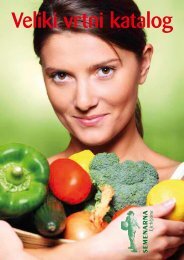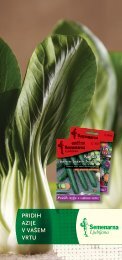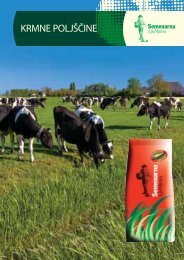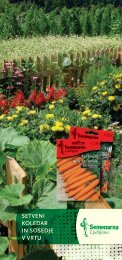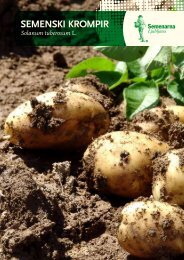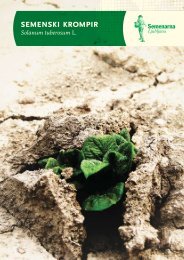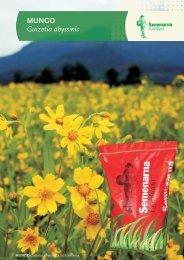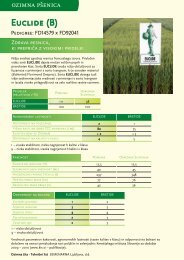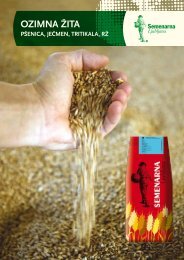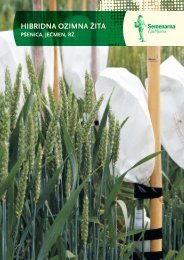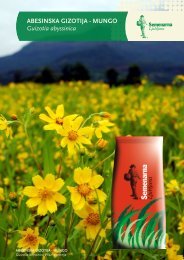katalog_ENG_20080221.indd 1 2/26/08 3:26:36 PM - Semenarna ...
katalog_ENG_20080221.indd 1 2/26/08 3:26:36 PM - Semenarna ...
katalog_ENG_20080221.indd 1 2/26/08 3:26:36 PM - Semenarna ...
Create successful ePaper yourself
Turn your PDF publications into a flip-book with our unique Google optimized e-Paper software.
Organic beetroot sprouts<br />
(Beta vulgaris)<br />
BioValentin Sprouts<br />
Organic fennel sprouts<br />
(Foeniculum vulgare)<br />
39 Organic<br />
Beetroot sprouts are red violet and have a nice taste. They<br />
contain a lot of vitamins (A, B1, B2, B3, B4, B5, B6, C, and<br />
E) and minerals (calcium, iron, phosphorus, magnesium,<br />
potassium, zinc, and sulphur). They are strengthening the<br />
immune system and stimulating digestion. They are excellent<br />
for salads, as well as for meat, and vegetable and fish<br />
dishes.<br />
Fennel sprouts have a delicate taste, are aromatic and have<br />
a smell and taste of anise. When we are consuming them, we<br />
get the influence that we are drinking Pastis (anise liqueur<br />
from Provance) without alcohol. They are rich in vitamins E,<br />
A, and B, as well as in iron, calcium, and manganese. They<br />
are a diuretic and influence the decreasing of fats in the organism.<br />
The sprouts are used as a spice to fish dishes and<br />
pasta. They are also very tasty as an extra to bread slices.<br />
Organic cabbage sprouts<br />
(Brassica oleracea)<br />
Red cabbage sprouts have red stems and are very tasty. They<br />
are also very decorative. They contain a lot of minerals: calcium,<br />
iron, phosphorus, iodine, magnesium, potassium, zinc,<br />
and sulphur. They are strengthening the resistance of the organism<br />
and stimulating digestion. They are excellent for salads<br />
and egg dishes, as well as for sandwiches and spreads<br />
for canapés.<br />
Organic soy sprouts<br />
(Glycine max)<br />
Soy sprouts contain a lot of proteins which are as perfect as<br />
the milk ones, fats, vitamins, and minerals. When germinating,<br />
five times more riboflavin (vitamin B2) and thiamine (vitamin<br />
B1) are produced and twice as much niacin. Also iron,<br />
which the soy contains quite a lot, is transformed into the<br />
more easily digestible forms. The sprouts are edible only if<br />
they are stewed or cooked (e.g., in stews, soufflés, and vegetable<br />
pastries).<br />
Organic radish Daikon sprouts<br />
(Raphanus sativus)<br />
Radish Daikon sprouts have a distinctive aromatic and<br />
slightly spicy taste. They contain a lot of potassium, calcium,<br />
iron, magnesium, phosphorus, and vitamins A, B1, B2, and<br />
C. They are strengthening the muscle tissues, improving the<br />
eyesight, have antiseptic effects, are stimulating the excretion<br />
of stomach juices and the activity of intestinal flora, improving<br />
digestion and strengthening the defensive power of<br />
the organism. They are excellent in cases of lack of appetite<br />
or digestion problems. They can be consumed in sauces,<br />
soufflés, egg dishes, with grilled meat and fish, cottage<br />
cheese dishes and spreads for canapés, as well as in lettuce<br />
and vegetable salads.<br />
Organic sunflower sprouts<br />
(Helianthus annuus)<br />
Sunflower sprouts have a taste of hazelnuts, so they are<br />
placed among the most tasteful sprouts. They contain proteins,<br />
carbohydrates, vitamins (A, B, E, C, and D), and minerals<br />
(magnesium, phosphorus, potassium, calcium, and<br />
iron). They are strengthening the teeth and bones, and have<br />
soothing effects on muscle pains. Sunflower sprouts are consumed<br />
in salads, vegetable dishes, and on canapés.<br />
Organic radish Sango sprouts<br />
(Raphanus sativus)<br />
Radish Sango sprouts are RED-VIOLET and have a distinctive<br />
aromatic, slightly spicy taste. They contain high quantities of<br />
potassium, calcium, iron, magnesium, phosphorus, and vitamins<br />
A, B1, B2, and C. They are strengthening the muscle<br />
tissues, improving the eyesight, have antiseptic effects, are<br />
stimulating the excretion of stomach juices and the activity<br />
of intestinal flora, improving digestion and strengthening the<br />
defensive power of the organism. They are excellent in cases<br />
of lack of appetite or digestion problems. They can be consumed<br />
in sauces, soufflés, egg dishes, with grilled meat and<br />
fish, cottage cheese dishes and spreads for canapés, as well<br />
as in lettuce and vegetable salads.<br />
Organic cress sprouts<br />
(Lepidium sativum)<br />
Garden cress sprouts have a distinctive aromatic taste. They<br />
contain high quantities of calcium and phosphorus, as well<br />
as vitamins A, B1, B2, and C. They are an excellent antibiotic.<br />
They are a diuretic and clean the blood. They are excellent in<br />
fighting against anaemia, bronchitis, and rheumatism. Furthermore,<br />
they work as an antidote to nicotine.<br />
Usage: They are best in tomato dishes, soups, vegetable<br />
soufflés, sauces, egg dishes, grilled meat and fish, cottage<br />
cheese dishes and as spreads on canapés, as well as in lettuce<br />
and vegetable salads as a vegetable or as a spice.<br />
Organic fenugreek sprouts<br />
(Trigonella foenum-graecum)<br />
Fenugreek sprouts are slightly spicy and of a uniquely refined<br />
taste. They contain a lot of mucilaginous substances, proteins,<br />
lecithin, and essential oils which are the cause of the<br />
plant’s distinctive smell. They are disinfecting the blood, liver,<br />
and kidneys. They are increasing the appetite and are excellent<br />
in fighting against anaemia and fatigue. The sprouts are<br />
used fresh as a spice for all kinds of rice (they supplement<br />
the seasoning mixture curry), soups, and salads.<br />
Organic green mung beans<br />
(green soya) sprouts<br />
(Vigna radiata)<br />
Green mung bean sprouts have a crispy and fresh taste. They<br />
are rich in proteins and starch. They do not contain oil. While<br />
germinating, the content of vitamins increases, significantly:<br />
there is five times more of riboflavin and ten times more of<br />
niacin. Furthermore, they are rich in vitamins E, A, and C, as<br />
well as in iron, calcium, potassium, magnesium, and phosphorus.<br />
They are regulating cholesterol levels, as well as disinfecting<br />
the blood and liver.<br />
Usage: They are best as a vegetable in soufflés, rice, millet,<br />
and barley dishes, as a substitute of meat for sauces to pasta,<br />
as a stuffing for pasta (tortellini), in vegetable rolls and<br />
dumplings, in egg dishes, vegetable pastry, and pizzas.<br />
<strong>katalog</strong>_<strong>ENG</strong>_<strong>20<strong>08</strong>0221.indd</strong> 39<br />
2/<strong>26</strong>/<strong>08</strong> 3:<strong>36</strong>:56 <strong>PM</strong>



